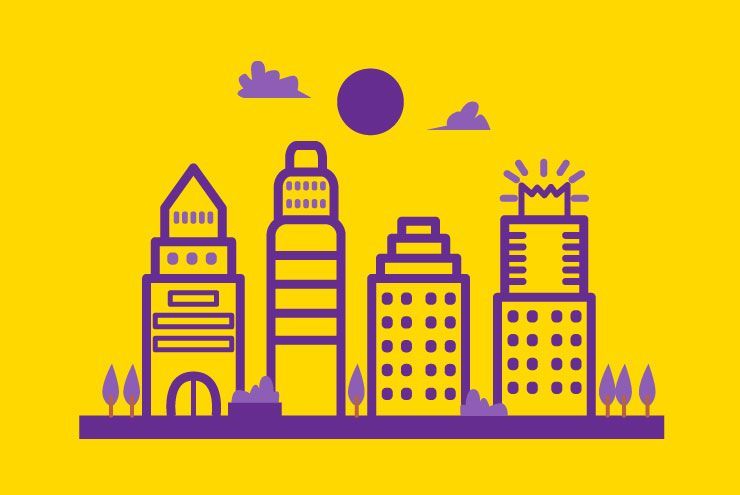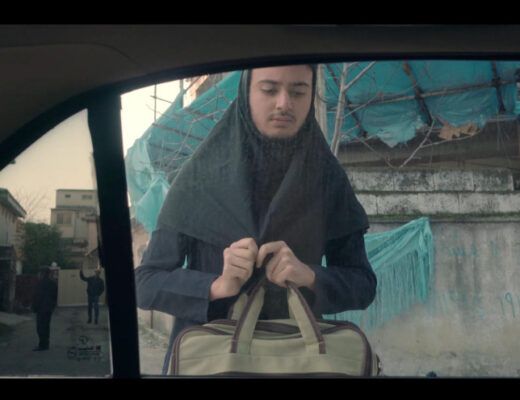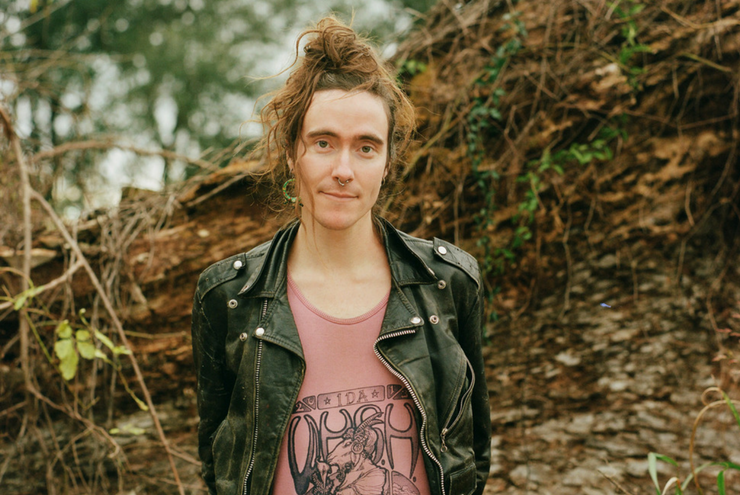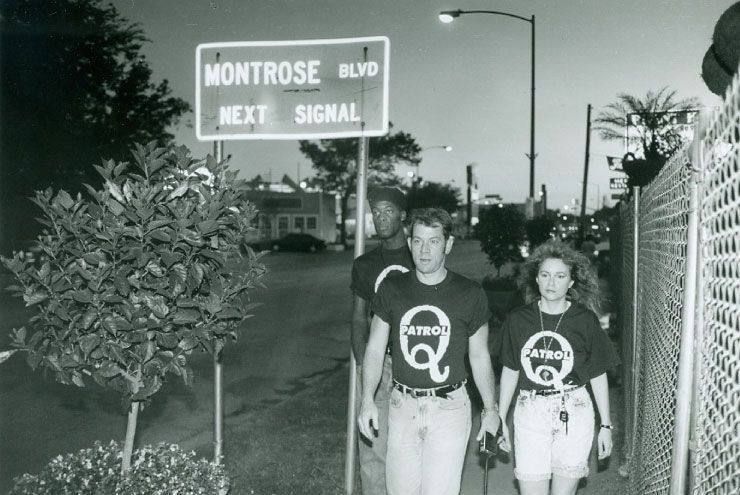By Autumn Rendall
For the first time in history, the city of Austin will officially recognize Intersex Awareness Day. The formal announcement, which will be made by Austin City Council on October 17, will declare October 26, from this year on, as Intersex Awareness Day.
Texans are invited to join the ACLU of Texas, HRC Austin, and Equality Texas on the steps of Austin City Hall at noon sharp on October 26 to show their dedication to intersex activism. “I am part of a long lineage of folks who have been working really, really hard for these rights,” says Alicia Roth Weigel, an Austin-based intersex policy activist helping to organize the event.
“Intersex,” according to Planned Parenthood, is a general term for a variety of conditions where a person is born with reproductive or sexual anatomy that doesn’t fit typical definitions of “female” or “male.” An estimated 1.7 percent of the population is intersex.
Often, when a baby is born intersex, doctors opt to perform surgery on the child’s genitals to make them appear more “male” or “female.” A hormone regimen is also prescribed for the child to take as they go through puberty. These surgeries and treatments can be extremely detrimental, Weigel notes, as they are life-altering and usually made before the child is old enough to give consent. Intersex-competent doctors are few and far between, she explains, making healthy conversations about the options for intersex people to naturally develop before, if ever, choosing a gender, a rarity. “The [medical community] makes these decisions [for us] and then ultimately treats our bodies like they are the gender that they’ve chosen for us,” Weigel says.
There is a huge lack of intersex representation in society, Weigel says, which predominantly stems from the lack of education around and shame associated with the identity. Many, even in the broader queer community, are still unaware of what the ‘I’ in ‘LGBTQIA’ stands for. “My whole life, I’ve grown up super closeted because there’s so much societal stigma,” Weigel says.
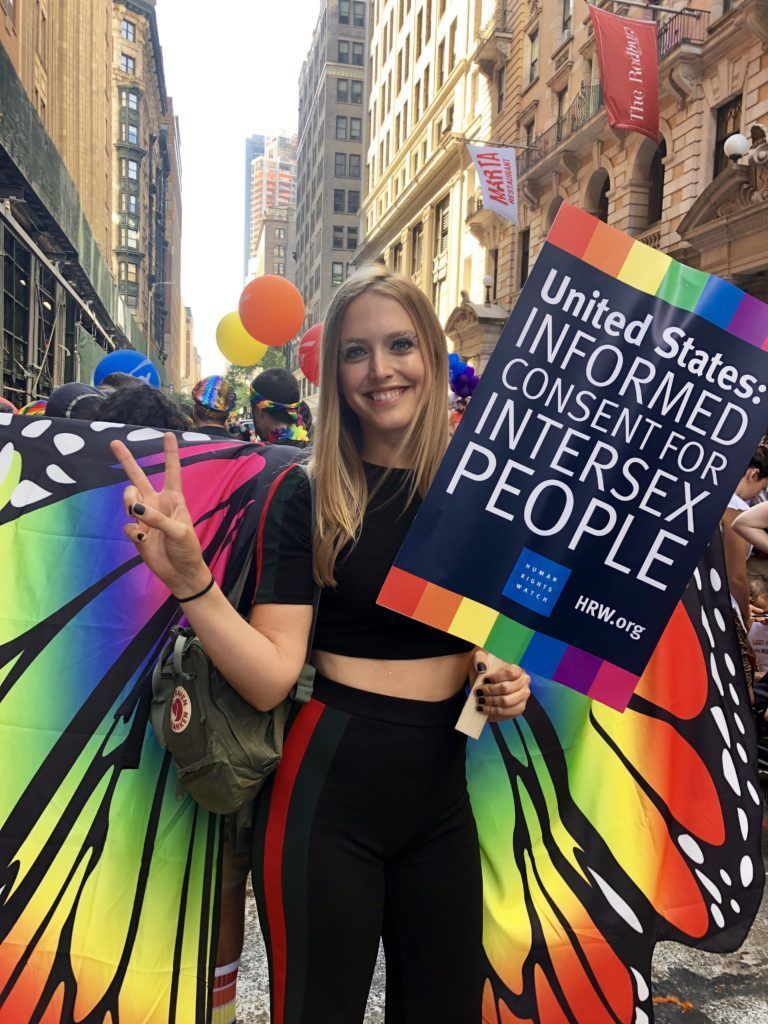
Intersex activist Alicia Roth Weigel at World Pride 2019. Photo: Kyle Knight/Human Rights Watch
Weigel was first inspired to be public and visible about her intersex identity after reading a magazine profile on intersex supermodel Hanne Gaby Odiele. Although Weigel knew that she had been born somewhere “in-between” male and female, had X and Y chromosomes, and had internal testes that were surgically taken from her at a young age, she had gone her entire life without hearing her identity referred to as “intersex.” “The whole conversation you get growing up is so medicalized and mythologized,” Weigel recalls. “No one ever told me ‘You’re intersex. You’re part of this broader intersex community.’”
Many consider being intersex “a big shameful secret,” Weigel says, noting that most surgeries on intersex newborns are to “theoretically help kids avoid being made fun of and shamed.” Yet, for Weigel, not truly understanding her intersex identity caused her years of issues with intimacy, relationships, and mental wellbeing.
Because she’s cis passing (someone who appears to be cisgender), Weigel has been encouraged throughout her life to hide her intersex identity, told it would make her unattractive to potential partners. “You want someone who loves you for who you are, not in spite of who you are,” Weigel says. “And so that’s why I choose to be visible.”
“That’s why I’m trying to be visible and show folks that you can be visible and live a good life as an intersex person,” Weigel adds.
Going to the doctor can be extremely triggering for intersex people, Weigel says, explaining that it’s common for healthcare providers to ask questions that show “they have no idea what intersex means.” “I get asked all the time ‘When was your last period?,’ when I’ve never had ovaries or a uterus,” Weigel says. “It doesn’t give you the sense [these doctors] are there for you and giving you adequate treatment if they don’t even understand who you are and what your body needs are.”
Silly questions can often be the best–case scenario for a doctor’s visit, Weigel continues. “The worst case scenario [I’ve experienced] was being in a gynecologist office, my legs up in stirrups, and having doctors call nurses into the room to be like ‘Look at how you would never know!’” “There’s just a lot of trauma that happens with everyday activities—that ‘normal’ people take for granted—like going to the doctor’s,” Weigel says. “It can really derail our entire day or our entire week.” Weigel notes that, at this time, she doesn’t even have a primary care physician, as living in Texas makes it nearly impossible to find a provider well-versed enough in intersex needs and care.
To alleviate these issues, Weigel argues for more research on the natural body development of intersex people, as well as a better understanding of the intersex community as a whole. In the medical community, this includes creating a proper consensus, standard of care, and best practices in medicine for intersex people.
There are easy, effective ways to help normalize the intersex community, and in turn, to raise intersex visibility, Weigel says. For example, simply using the full LGBTQIA acronym promotes inclusion of intersex identity within the larger queer community. “We need people to know we exist,” Weigel says. “And they can’t know we exist if we don’t start including the word ‘intersex’ all the time when we’re talking about our issues.”
The Austin event aims to center this necessary inclusion. Scheduled speaker Danielle Skidmore, a trans woman and board member of Equality Texas, a state-wide advocacy organization working to defend the rights of LGBTQIA Texans, will address the broader queer community on how every one of us should be a megaphone for the intersex community, in order to raise visibility, educate ourselves, and leverage our collective power. A few Austin City Council members will also speak on the social justice aspect of intersex equality and how it is an issue of body autonomy and informed consent. And voices from the intersex community, like Weigel, will share personal stories about their experiences with intersex injustice and their ongoing activism.
The event will also include a statement from the chief of urology at Dell-Seton Medical Center. The statement, Weigel explains, is an apology on behalf of all urologists for the decisions that were made on behalf of intersex children without their consent—a call to action for other urologists to start speaking out against these human rights violations. “It’s about bringing doctors into the conversation,” Weigel says. “Having doctors’ voices on our agenda shows that doctors need to be working with the intersex community.”
Weigel says that, by attending the event, people are showing that intersex issues deserve to be taken seriously. “We need the City of Austin to care about these rights,” Weigel stresses. “We need the South and people all across the United States to care about these rights. And that’s not going to happen if people don’t show up for the event and show that it matters.”
For more information and to RSVP, visit the Facebook event.


